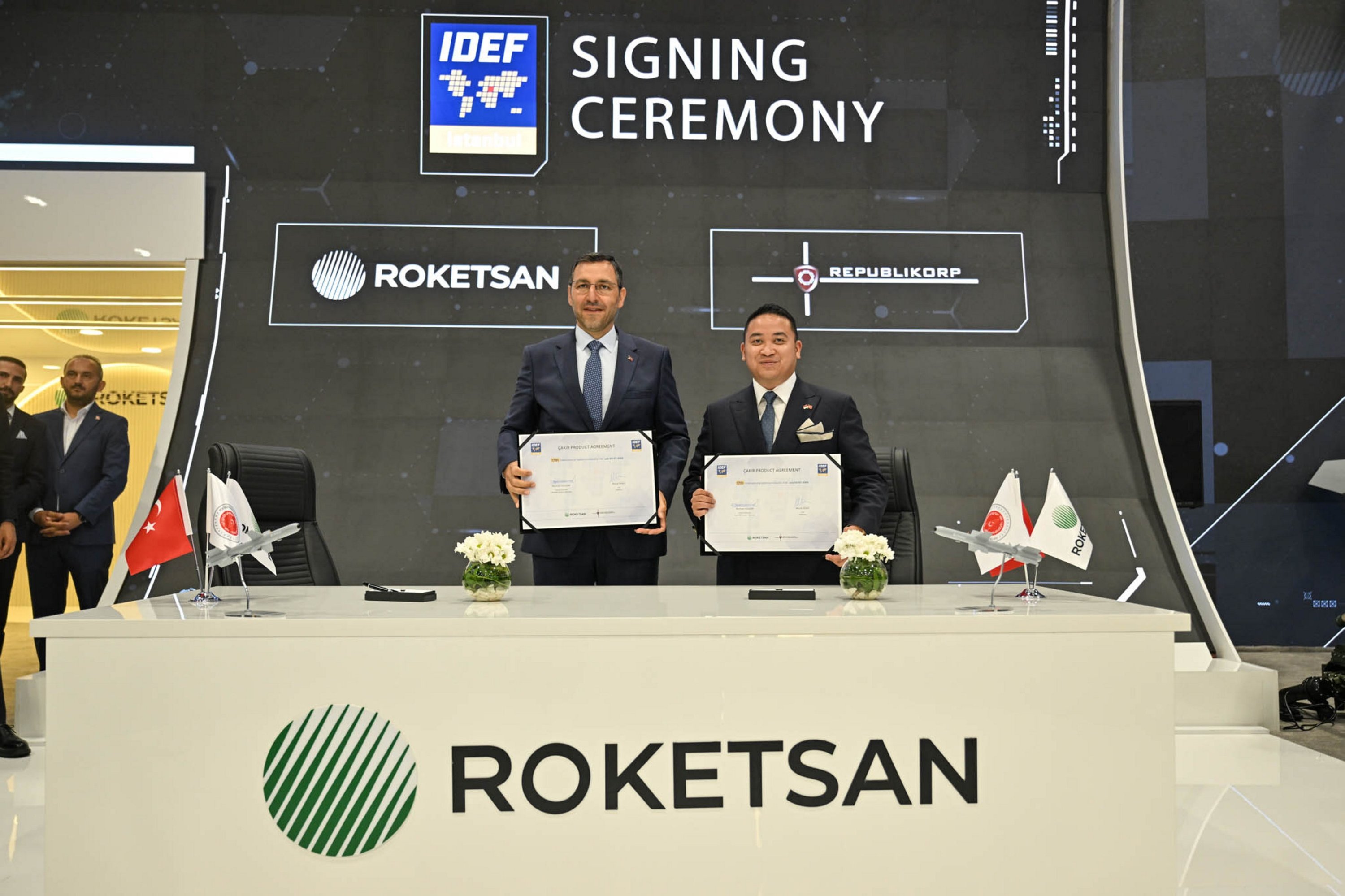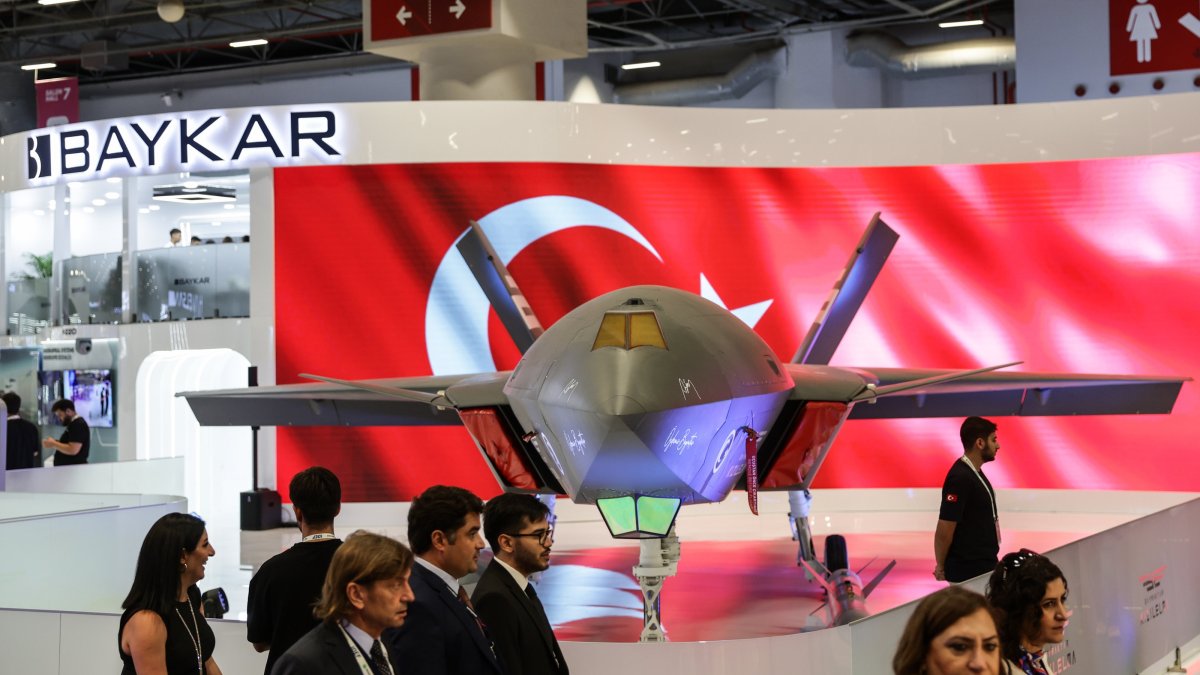Over more than two decades, Türkiye’s defense industry has steadily advanced, and artificial intelligence is now a central driver of this transformation.
AI integration marks a turning point, not only in technology but in strategic outlook. Today’s defense sector transcends traditional boundaries, entering a new era dominated by digital and AI-enabled systems.
Türkiye’s national strategy, dubbed “AI for Defense,” was prominently showcased at this week’s 17th International Defense Industry Fair (IDEF) 2025, carrying the motto “futureAIready.”
Presidency of Defense Industries’ (SSB) Defense Industry Artificial Intelligence Talent Cluster, or SAYZEK, is a program that aims to build a talent matrix for the ecosystem, initiate collaborations in key areas, channel civilian innovation into defense applications and foster clusters of AI-skilled professionals.
The program also focuses on accelerating commercialization, optimizing shared infrastructure and labs, and raising awareness about the role of artificial intelligence in defense.
Becoming global player
IDEF 2025 has featured live demonstrations of AI-powered systems, including AI-supported solutions aimed at providing enhanced situational awareness to ships by processing real-time data, developed for civil maritime use.
Turkish defense firms are also making major moves in AI integration. Havelsan presented a range of products, from multidomain command architectures to AI-assisted decision support systems and manned-unmanned combat teams.
SAYZEK’s ambition is to position Türkiye as a global leader in AI-powered defense technology by building a sustainable ecosystem that connects academic excellence, industrial deployment and strategic partnerships.
Top 5 AI-driven companies
Havelsan is a leader in command and control systems, AI-assisted decision support systems, manned-unmanned team operations and software development.
At Aselsan’s research center, work is being carried out in some of the most popular application areas of artificial intelligence, including computer vision, natural language processing and decision-making. The company integrates AI into electronic, communication and warfare systems.
Drone magnate Baykar has successfully destroyed ground targets with the KEMANKEŞ 1, a domestically and uniquely developed AI-powered miniature cruise missile. Baykar is a pioneer in autonomous missile technologies powered by artificial intelligence.
Turkish Aerospace Industries (TAI), Türkiye’s leading aerospace company, not only develops and manufactures air platforms but also works on equipping them with the latest technologies using artificial intelligence. It develops AI applications specifically for aerospace platforms.
STM conducts research on the use of generative AI technologies in defense and merges engineering capabilities with a futuristic vision for Türkiye’s security and technological independence.
Export deals, startup collaborations sealed at IDEF 2025
The International Defense Industry Fair (IDEF) 2025 serves not only as a platform for showcasing cutting-edge military technologies but also as a hub for strategic partnerships and collaboration.
Türkiye’s leading defense companies signed new agreements to strengthen exports and support innovation through collaborations with startups, ensuring that groundbreaking ideas gain traction within the sector.
Roketsan, Türkiye’s premier developer of rocket, missile and munitions technologies, signed key contracts covering both domestic and international projects.
Building on its previous contributions to Azerbaijan’s defense capabilities, particularly with next-generation systems, Roketsan expanded its cooperation in artillery technologies.
On Tuesday, Azerbaijani Deputy Minister of Defense Agil Gurbanov and Roketsan Chair Faruk Yiğit signed the “Artillery Systems Cooperation Protocol,” reinforcing the strategic defense alliance between the two countries.
Export boost
Roketsan, representing Türkiye on the global stage through its widespread exports, is deepening its defense partnership with Indonesia through new agreements.
On the second day of IDEF 2025, Roketsan and PT Republik Defense Indonesia (RDI), one of Indonesia’s leading defense organizations, signed two separate agreements outlining the supply and production of the Çakır cruise missile.

Murat Ikinci (L), general manager of Roketsan, and Norman Joesoef, founder of Republikorp, after signing an agreement during the International Defence Industry Fair (IDEF), Istanbul, Türkiye, July 23, 2025. (AA Photo)
The contracts were signed by Norman Joesoef, group president of Republik Korpora Indonesia, RDI’s parent company, and Murat Ikinci, general manager of Roketsan.
Innovation ecosystem
In parallel with its export activity, Roketsan is increasing its support for new ventures.
Through a new institutional partnership agreement with Teknopark Istanbul, signed by Ikinci and Teknopark CEO Abdurrahman Akyol, Roketsan aims to boost incubation programs for early-stage defense and technology startups.
The “Incubation Center-Oriented Institutional Cooperation Protocol” focuses on commercializing innovative ideas and integrating them into the broader ecosystem, especially in the defense and technology sectors.
Türk Telekom expands investments to strengthen digital sovereignty
Türk Telekom’s investments in cybersecurity contribute to the development of technologies that are vital for both commercial success and national security. The company plays a key role in enhancing Türkiye’s digital sovereignty capacity.
In recent years, Türk Telekom has been actively developing technological solutions in the fields of defense and cybersecurity, while also investing in innovative startups to reinforce Türkiye’s tech ecosystem.
TT Ventures, the venture capital investment arm of Türk Telekom, was established in 2018 as a wholly owned subsidiary of the Türk Telekom Group. The company supports high-growth potential startups operating in sectors that can create synergy with telecommunications.
TT Ventures’ investment strategy focuses on seed and pre-seed stage ventures in artificial intelligence, software and machine learning, with a particular emphasis on the European and Turkish markets.
Cyber camps
To support young talent, Türk Telekom organizes cybersecurity camps, contributing to the cultivation of a qualified workforce in the sector. The company’s pivotal role in this space stems from the critical importance of telecommunications infrastructure. Telecommunication operators play a major role in strengthening a country’s cybersecurity capacity.
Türk Telekom’s investments in the defense industry and cybersecurity carry strategic significance for enhancing Türkiye’s technological independence and cybersecurity capabilities. Its activities in this domain serve goals such as developing innovative solutions to protect critical infrastructure, integrating young professionals into the industry and nurturing Turkish ventures that can compete in international markets.
Every line of code carries carbon footprint
Every developer’s code is, in essence, a step toward the future. The green software development approach ensures those steps are environmentally friendly, proving that technology and nature can coexist harmoniously.
Every app we use, every website we visit and every piece of software we run quietly affects the environment. This hidden reality of the digital world is sparking a new wave of awareness in the tech industry: code, too, has a carbon footprint. Environmental sustainability in software development has become far too critical to ignore.
One pioneering approach in this area is GreenCodex, an innovative solution from Doğuş Teknoloji. The system makes software energy consumption visible and offers developers concrete suggestions to reduce carbon emissions.
Digital footprint of code
Many people think of software as abstract code running on screens, but the reality is quite different. Every algorithm, loop and data processing operation consumes energy on physical servers behind the scenes, and that energy use translates directly into carbon emissions.
Large-scale applications and complex algorithms, in particular, consume significant electrical energy, increasing their environmental impact. Inefficient code structures, unnecessary loops and unoptimized algorithms overuse server resources, leading to energy waste.
AI-powered solutions
AI-supported platforms like GreenCodex offer innovative fixes to these issues. These systems analyze algorithmic complexity and suggest more efficient alternatives. They detect loop density to uncover optimization opportunities, monitor resource usage to reveal excessive consumption and identify repeated code to promote cleaner structures.
This analytical approach brings a sustainability mindset into the software development process. Developers are now assessing their code not just for functionality and performance, but also for environmental impact. The benefits of green coding aren’t just theoretical; carbon emissions can be reduced by up to 33%, energy consumption drops significantly and server resources are used more efficiently. Businesses also gain a boost toward achieving their sustainability goals.
